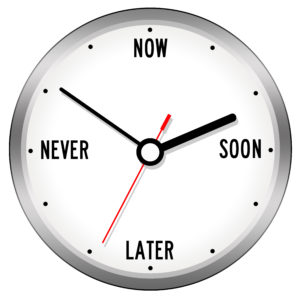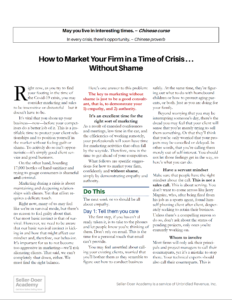
Building your authority through speaking at professional and industry conferences.
In Becoming a Seller-Doer, I introduce the RLOCK model that reflects the five stages of the client lifecycle: Recognition, Lead, Opportunity, Close, and Keep. The R is about building recognition for your professional expertise and your firm’s brand and capabilities.
Building recognition can be done in many ways: blogging, writing articles for professional or trade periodicals, speaking at conferences, or conducting webinars or lunch-and-learns.
One of the 44 executives I interviewed for the book, Laura Wernick, AIA of HMFH Architects in Boston, spent the most time talking about how “authority marketing,” as some call it, helped her generate scads of business over the decades. This post is an excerpt from my interview with Laura.
Jim: Tell me about yourself.
Laura Wernick: I’m a graduate of Cornell University. I got my Bachelor of Architecture there and then came to Boston, and I’ve been in the Boston Cambridge area ever since. I’ve been with HMFH Architects for over 25 years. I focus on educational design and how to create the best facilities for teaching and learning, primarily for students in K-12 environments.
Educational design really captured my imagination. We were working with young kids a lot, so everything we did was to stimulate their curiosity and excite them. To be able to design in a very playful and imaginative way – We had some very wondrous and special environments, which were engaging, and I fell in love with that. I also got intrigued by how schools are a piece of the community. They really are community centers.
I got very engaged in the history of school design and if schools have always been that way. There is a fascinating story to school design and how you can use it thematically to look at history, to look at lighting, to look at mechanical systems, and to look at how education has evolved over the years. And that’s my fascination with schools as a building type. It was my entry point into starting to do marketing, even before I knew that’s what I was doing. I turned my interest in school design into research and the research into, early on, some talks at small conferences. And I think for the first conference, I actually paid for my transportation and registration fee because I didn’t even know that that was important to a firm’s marketing.
I think the first place I spoke was at a conference for what, at the time, was called the Council for Education Facility Planners International, CEFPI. It’s since become the Association for Learning Environments, A4LE, but in both manifestations, it focuses on creating great environments for students.
Jim Rogers: Often, people with technical expertise who want to put it out in the world to help others like to go to their professional association to do that. Well, that’s where your competitors, peers, and colleagues are, and if you’re not taking it to where your prospective clients are, then you’re limiting your impact. Is there a talk that stood out for you that paid off or surprised you with the result you got?
Laura Wernick: Well, that first one was quite the learning experience, and I had people asking me questions that I didn’t know the answers to, so I had to learn to sharpen my game. In terms of payoff, I think it helped allow us to spread more nationally. Over time, as I attended these conferences regularly and ultimately became part of the organization’s leadership, I got invited to other places in the country to interview and participate in pursuing schools. So that was one outcome, but I can’t tie it to a single presentation. It was building that over time.
The other thing, as you said, is that there are different architects or competitors at those conferences. The advantage was we could get invited to other places in the country where these teaming partners needed our expertise. I found over time that those peers sometimes became resources for us when we were looking for consultants in a different part of the country.










